Suchergebnisse
COOL-QUARTER-PLUS - GHG-neutral cooling of office and research quarters
Development of systems for the emission-neutral cooling of office, research and urban quarters on the basis of photovoltaic or geothermal energy supply and user integration. Life cycle cost calculations and analyses of grey and operational greenhouse gas emissions allow a holistic assessment.
lowTEMP4districtheat - Senkung der Systemparameter von Wärmenetzen zur Integration erneuerbarer Wärmequellen mittels Soft-Sensorik
Analyse des Einsatzes von Soft-Sensorik in Ergänzung zu punktuellen Realmessungen zur vollständigen Erfassung von Echtzeitparameter von Wärmenetzen. Die damit gewonnenen Daten ermöglichen detaillierte Netzsimulationen mit geringen Anforderungen an die Rechenleistung und bilden die Basis einer Strategie zur Absenkung der Netztemperaturen sowie der gezielten Einspeisung dezentraler Wärmeerzeuger.
lowTEMP4districtheat - Reduction of the system parameters of heating networks for the integration of renewable heat sources using soft sensors
Analysis of the use of soft sensors in addition to selective real measurements for the complete recording of real-time parameters of heating networks. The data obtained enable detailed grid simulations with low computing power requirements and form the basis of a strategy for lowering the grid temperatures and feeding in decentrally generated heat.
Storage Cascade MZ: Storage cascade system to establish urban PLUS energy systems on the example of the city of Mürzzuschlag
In the "Storage Cascade MZ" project, battery storage systems are implemented on different grid levels in the city of Mürzzuschlag, whose measurement data enable an integrated grid monitoring and create the basis for a future expansion of the nominal power of photovoltaic (pv) systems.
Energiemosaik Austria - Österreichweite Modellierung und webbasierte Visualisierung von Energieverbrauch und CO2-Emissionen auf Gemeindeebene
Inhalt des Projektes ist eine alle Nutzungs- und Mobilitätsarten umfassende Modellierung und webbasierte Visualisierung von Energieverbrauch und Treibhausgasemissionen aller österreichischen Gemeinden. Die Ergebnisse können in zahlreiche energie- und klimarelevante Handlungsfelder integriert und für die Sensibilisierung von Entscheidungsträgern und Öffentlichkeit genutzt werden.
Monitoring Mehrfamilienhäuser "Tonpfeifengasse"
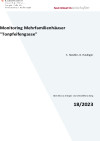
Messtechnische Begleitung und Bewertung der Funktionsweise von Bauteilaktivierung als Speicher für Umweltenergien am Beispiel der Wohnhausanlage Tonpfeiffengasse.
Schriftenreihe
18/2023
S. Handler, G. Haslinger
Herausgeber: BMK
Deutsch, 72 Seiten
Downloads zur Publikation
Digital technologies
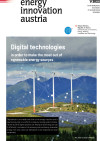
Digital technologies in order to make the most out of renewable energy sources.
energy innovation austria
1/2022
Herausgeber: BMK in cooperation with the Climate and Energy Fund
Englisch, 12 Seiten
Downloads zur Publikation
Monitoring of multi-family houses “Tonpfeifengasse”
Evaluation of activated building parts as heat storage for renewable energy shown on the example of the multi-family houses "Tonpfeifengasse".
Langzeitevaluierung des Energieverbrauchs von 100 energieeffizienten Gebäuden in Österreich als repräsentativer Querschnitt österreichischer Leuchtturmobjekte (LZE 100 Leuchtturmobjekte)
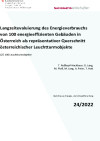
Erfassung, Auswertung und Analyse von Energieverbrauchsdaten von 100 energieeffizienten Gebäuden in Österreich über eine Betriebszeit von 3 bis 25 Jahren als repräsentativer Querschnitt der österreichischen Leuchtturmobjekte. Differenzierung nach Gebäudetypen, Energieträger und Ermittlung der realen Treibhausgas-Emissionen. Vergleich der gemessenen Verbräuche zu Benchmark-Werten.
Schriftenreihe
24/2022
T. Roßkopf-Nachbaur, G. Lang, M. Ploß, M. Lang, A. Peter, T. Hatt
Herausgeber: BMK
Deutsch, 143 Seiten
Downloads zur Publikation
Energiemosaik Austria - Österreichweite Modellierung und webbasierte Visualisierung von Energieverbrauch und CO2-Emissionen auf Gemeindeebene
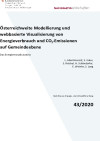
Inhalt des Projektes ist eine alle Nutzungs- und Mobilitätsarten umfassende Modellierung und webbasierte Visualisierung von Energieverbrauch und Treibhausgasemissionen aller österreichischen Gemeinden. Die Ergebnisse können in zahlreiche energie- und klimarelevante Handlungsfelder integriert und für die Sensibilisierung von Entscheidungsträgern und Öffentlichkeit genutzt werden.
Schriftenreihe
43/2020
L. Abart-Heriszt, S. Erker, S. Reichel, H. Schöndorfer, E. Weinke, S. Lang
Herausgeber: BMK
Deutsch, 56 Seiten
Downloads zur Publikation
Ergebnisband „Urban Data Management“
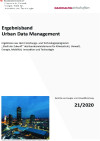
Der vorliegende Ergebnisband stellt abgeschlossene Projekte aus dem Forschungs- und Technologieprogramm „Stadt der Zukunft“ des Bundesministeriums für Klimaschutz, Umwelt, Energie, Mobilität, Innovation und Technologie (BMK) im Bereich Urban Data Management vor. Die gewonnenen Erkenntnisse sollen eine Entwicklung in Richtung energieeffiziente und klimaverträgliche Stadt unterstützen, die auch dazu beiträgt, die Lebensqualität und die wirtschaftliche Standortattraktivität zu erhöhen.
Schriftenreihe
21/2020
Redaktionelle Gestaltung: Bianca Pfefferer, Hannes Warmuth (ÖGUT)
Herausgeber: BMK
Deutsch, 24 Seiten
Downloads zur Publikation
Ergebnisband „Klimaneutrale Städte"
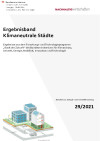
Der vorliegende Ergebnisband stellt abgeschlossene Projekte aus dem Forschungs- und Technologieprogramm „Stadt der Zukunft“ des Bundesministeriums für Klimaschutz, Umwelt, Energie, Mobilität, Innovation und Technologie (BMK) im Bereich Klimaneutrale Städte vor. Die gewonnenen Erkenntnisse sollen eine Entwicklung in Richtung energieeffiziente und klimaverträgliche Stadt unterstützen, die auch dazu beiträgt, die Lebensqualität und die wirtschaftliche Standortattraktivität zu erhöhen.
Schriftenreihe
29/2021
Redaktionelle Gestaltung: Bianca Pfefferer, Hannes Warmuth (ÖGUT)
Herausgeber: BMK
Deutsch, 22 Seiten
Downloads zur Publikation
LINE-FEED - Plug-in Photovoltaik-Speicher für die Steckdose
Im Projekt LINE-FEED wurden Technologien entwickelt, die für einen Photovoltaik-Speicher benötigt werden, der von jedem Laien an einer gewöhnlichen Steckdose angeschlossen werden kann. Ziel war die Entwicklung eines Speichersystems für Haushalte in urbanen Räumen, welche selbst keine Möglichkeit der Installation einer Photovoltaikanlage haben.
LINE-FEED - Plug-in Photovoltaic Storage for the Wall Socket
The project LINE-FEED developed technologies that are required for a photovoltaic storage system which can be installed by anybody by simply plugging it into a wall socket. The aim was to create a storage system for households in urban areas that do not have the possibility to install a photovoltaic system themselves.
Ergebnisband „Urbane Wärme und Kälte“
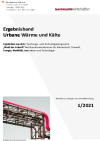
Der vorliegende Ergebnisband stellt abgeschlossene Projekte aus dem Forschungs- und Technologieprogramm „Stadt der Zukunft“ des Bundesministeriums für Klimaschutz, Umwelt, Energie, Mobilität, Innovation und Technologie (BMK) im Bereich Urbane Wärme und Kälte vor. Die gewonnenen Erkenntnisse sollen eine Entwicklung in Richtung energieeffiziente und klimaverträgliche Stadt unterstützen, die auch dazu beiträgt, die Lebensqualität und die wirtschaftliche Standortattraktivität zu erhöhen.
Schriftenreihe
1/2021
Redaktionelle Gestaltung: Bianca Pfefferer, Hannes Warmuth (ÖGUT)
Herausgeber: BMK
Deutsch, 24 Seiten
Downloads zur Publikation
BIMaterial Process Design for Material Building Pass
Building Information Modelling supported compilation of a Material Building Pass; as a qualitative and quantitative documentation of the material composition of, and the material distribution within, a building structure. This project is a central milestone towards standardized, BIM-generated building material passes.
Monitoring und Evaluierung von städtischen Energieflüssen
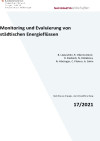
Ausgangsbasis für das Projekt sind die Energiestatistiken. In einem ersten Schritt wird die Erhebungsmethodik im Detail analysiert. Basierend auf den Erkenntnissen der Analyse wird eine Methodik zur Erstellung städtischer Energieflüsse erstellt. Diese wird mithilfe des zu entwickelnden Planungsinstruments "Senflusk" an 5 Referenzstädten getestet.
Schriftenreihe
17/2021
B. Lepuschitz, R. Obernosterer, H. Daxbeck, N. Kisliakova, N. Hörzinger, C. Ploiner, A. Sahin Berichte aus Energie- und Umweltforschung 17/
Herausgeber: BMK
Deutsch, 65 Seiten
Downloads zur Publikation
scaleFLEX - Scalable method for optimizing the energy flexibility of districts
Development of a decentrally organized automation method for improving the demand-side flexibility options of buildings and districts. The utilized data-driven algorithm promise high scalability and therefore low installation and operating costs. The developed method will be validated using different building types (high-tech office buildings, low-tech office buildings, residential buildings).
see-it - Camera based, user centric daylight control system for optimized working conditions
In the project technologies in the field of building construction and building automation are being researched for quality and performance improvements in the workplace. The aim is to individualize the control of sun protection to the people who need to be protected from glare and overheating and hope to see through.
StromBIZ - Demonstrationsprojekte: Geschäftsmodelle dezentrale Stromerzeugung und Distribution
Ein "Tipping Point" bei der Umsetzung der Energiewende sind Geschäftsmodelle zur Vor-Ort-Nutzung von regenerativ erzeugtem Strom. Es wurden anhand von mehreren Demonstrations-PV-Anlagen auf Wohn- und Nichtwohngebäuden neue Geschäftsmodelle der dezentralen Stromerzeugung und Distribution entwickelt, implementiert, getestet und schließlich kommuniziert.
